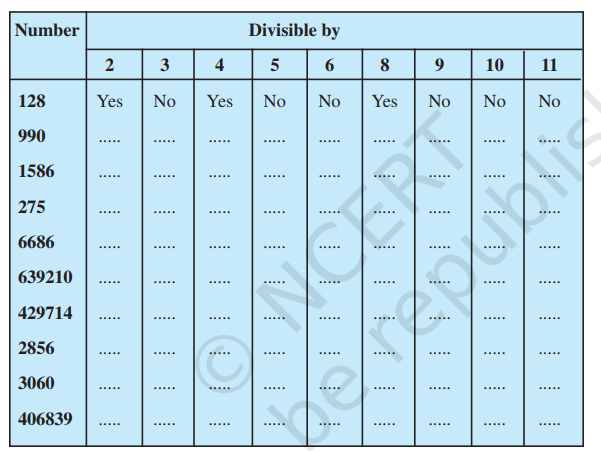CBSE#!#Divisibility Rules of 2,3,5,6,9 and 10
Step by step video solution for CBSE#!#Divisibility Rules of 2,3,5,6,9 and 10 by Maths experts to help you in doubts & scoring excellent marks in Class 6 exams.
Updated on:21/07/2023Similar Questions
Knowledge Check
Find the least square number which is divisible by 3, 5, 6, and 9.
A900B90C8100D81Five numbers are selected from 1, 2, 3, 4, 5, 6, 7, 8 and 9. The probability that their product is divisible by 5 or 7 is
A14B34C56D16
2x+3y=5
6x+9y=10
View SolutionWhich of the following statements are true? (a)If a number is divisible by 3, it must be divisible by 9.
(b)If a number is divisible by 9, it must be divisible by 3.
(c)If a number is divisible by 4, it must be divisible by 8.
(d)If a number is divisible by 8, it must be divisible by 4.
(e)A number is divisible by 18, if it is divisible by both 3 and 6.
(f)If a number is divisible by both 9 and 10, it must be divisible by 90.
View SolutionUsing divisibility tests, determine which of the following numbers are divisible by 2;by 3; by 4; by 5; by 6; by 8; by 9; by 10 ; by 11 (say, yes or no):

View SolutionIn the given series, how many 8s are there that are not divisible by the number to its left but completely divisible by the number to its right. 5 6 3 2 4 8 8 8 9 2 6 6 5 8 8 3 4 3
View SolutionProve that ,the relation R on the set A={1,2,3,4,5,6,7,8,9,10,11,12,13} defined by aRb if and only if a-b is divisible by 3 ,is an equivalence relation.
View SolutionHow many 6-digit numbers can be formed from the digits 0,3,5,7 and 9 which are divisible by 10 and no digits is repeated?
View Solution
